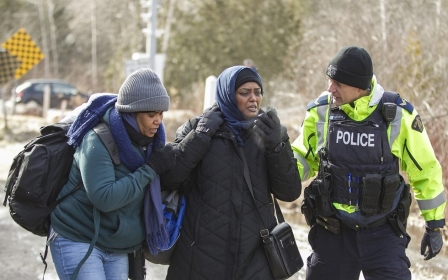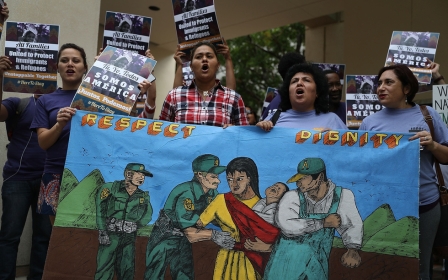US states challenge Trump's revised travel ban in court
The top prosecutor in the state of Washington said on Thursday that his office was filing a motion to block US President Donald Trump's revised travel ban targeting citizens of six Muslim-majority countries.
New York's attorney general, Eric Schneiderman, also said on Thursday he would be joining Washington's lawsuit against the new ban, and the states of Oregon, Minnesota and Massachusetts said they would too. Hawaii on Tuesday filed the first legal challenge to the new executive order.
Washington Attorney General Bob Ferguson, whose state was the first to sue over Trump's initial travel ban that created chaos worldwide and was eventually blocked, said at least three other states are expected to join the new legal battle.
He said his motion calls on an existing injunction against the travel ban issued in January to be applied to the new directive.
"We're asserting that the president cannot unilaterally declare himself free of the court's restraining order and injunction," Ferguson told reporters.
"It's our view that the temporary restraining order that we've already obtained remains in effect."
He argued that although the revised order issued on Monday was narrower in scope, it still has the same constitutional problems as the executive order issued in January.
Ferguson had emerged as a prominent opponent after he led the legal argument that succeeded in suspending the first set of travel restrictions, which became known as the “Muslim ban”.
New York’s Schneiderman said he is happy to join other states’ attorney generals to protect federal law.
“President Trump’s latest executive order is a Muslim ban by another name, imposing policies and protocols that once again violate the Equal Protection Clause and Establishment Clause of the United State Constitution,” he said in a statement.
Massachusetts Attorney General Maura Healey called the executive order Muslim ban 2.
The new order denies US entry to all refugees for 120 days and halts for 90 days the granting of visas to nationals from Syria, Iran, Libya, Somalia, Yemen and Sudan. It is due to take effect on 16 March.
The first order had also applied to citizens of Iraq, but that country was dropped from the new list.
The first order was hit by more than two dozen lawsuits.
In response to Washington's suit, US District Judge James Robart in Seattle last month ordered an emergency halt to the policy. That ruling was upheld by an appeals court in San Francisco.
Last month, Trump described Robart as a "so-called judge," drawing outrage from what his opponents saw as lack of respect for the judicial system. "See you in court," the president tweeted after the appeals court's decision.
The government has claimed the president has wide authority to implement immigration policy and that the travel rules are necessary to protect against terrorist attacks.
The states and immigration advocates argue the new ban, like the original one, discriminates against Muslims.
"The choices of these countries are arbitrary. The Department of Homeland Security has confirmed there is no risk from the citizens of this arbitrary set of countries... What we know is that this is a Muslim ban. That’s what it is," Manny Garcia, deputy executive director of the Texas Democratic Party, told Middle East Eye on Monday.
Trump's new executive order was designed with the intention of avoiding the legal hurdles.
New MEE newsletter: Jerusalem Dispatch
Sign up to get the latest insights and analysis on Israel-Palestine, alongside Turkey Unpacked and other MEE newsletters
Middle East Eye delivers independent and unrivalled coverage and analysis of the Middle East, North Africa and beyond. To learn more about republishing this content and the associated fees, please fill out this form. More about MEE can be found here.




